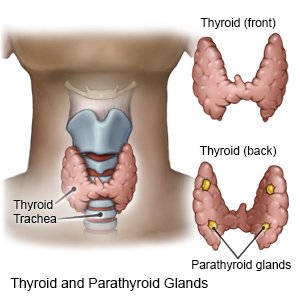Thyroid Cancer
Medically reviewed by Drugs.com. Last updated on Aug 4, 2025.
AMBULATORY CARE:
Thyroid cancer
begins in your thyroid gland. The cancer is usually found before it spreads to other organs or tissue. Your thyroid is a small, butterfly shaped gland in your neck. It makes hormones that help control your body temperature, heart rate, growth, and weight.
 |
Common symptoms include the following:
- One or more lumps in your neck
- Cough, hoarseness, or changes in your voice
- Trouble swallowing or breathing
- Neck or throat pain
Call your local emergency number (911 in the US) if:
- You have sudden shortness of breath.
Related medications
Treatment options
The following list of medications are related to or used in the treatment of this condition.
Call your doctor or oncologist if:
- Your symptoms get worse.
- Your voice becomes hoarse.
- You have nausea or are vomiting.
- You have new lumps in your neck.
- You have trouble swallowing.
- You have questions or concerns about your condition or care.
Treatment for thyroid cancer
may include any of the following:
- Surgery may be done to remove all or part of your thyroid gland. Your healthcare provider may also need to remove tissue or lymph nodes near your thyroid gland.
- Radioactive iodine may be given to damage cells in your thyroid. This may help to decrease thyroid hormone levels or to kill cancer cells.
- Radiation therapy uses x-rays or gamma rays to treat cancer. Radiation kills cancer cells and may stop the cancer from spreading. It may be given with radioactive iodine therapy or after surgery to remove your thyroid.
- Medicine may be given to help bring your thyroid hormone level back to normal.
Manage thyroid cancer:
- Do not smoke. Nicotine can damage blood vessels and make it more difficult to manage your thyroid cancer. Smoking also increases your risk for new or returning cancer and delays healing after treatment. Do not use e-cigarettes or smokeless tobacco in place of cigarettes or to help you quit. They still contain nicotine. Ask your healthcare provider for information if you currently smoke and need help quitting.
- Limit or do not drink alcohol as directed. Men should limit alcohol to 2 drinks per day. Women should limit alcohol to 1 drink per day. A drink of alcohol is 12 ounces of beer, 5 ounces of wine, or 1½ ounces of liquor.
- Eat healthy foods. Healthy foods include fruits, vegetables, whole-grain breads, low-fat dairy products, beans, lean meats, and fish. Include foods that are high in iodine, such as milk, seaweed, and turkey. Iodized salt is also a source of iodine. Ask your healthcare provider how much iodine you need each day, and which sources of iodine are best for you.

- Drink liquids as directed. Ask how much liquid to drink each day and which liquids are best for you. Drink extra liquids to prevent dehydration. You will need to drink extra liquids if you are vomiting or have diarrhea from cancer treatments.
- Exercise as directed. Exercise can help increase your energy level. Ask your healthcare provider how much exercise you need and which exercises are best for you.

Follow up with your doctor or oncologist as directed:
You may need to return for more blood tests to check your thyroid hormone level. This will show if you are getting the right amount of thyroid medicine. Write down your questions so you remember to ask them during your visits.
© Copyright Merative 2025 Information is for End User's use only and may not be sold, redistributed or otherwise used for commercial purposes.
The above information is an educational aid only. It is not intended as medical advice for individual conditions or treatments. Talk to your doctor, nurse or pharmacist before following any medical regimen to see if it is safe and effective for you.
Learn more about Thyroid Cancer
Treatment options
- Medications for Hepatic Tumor
- Medications for Lung Cancer
- Medications for Thyroid Cancer
- Medications for Thyroid Tumor
Care guides
Symptoms and treatments
Further information
Always consult your healthcare provider to ensure the information displayed on this page applies to your personal circumstances.
